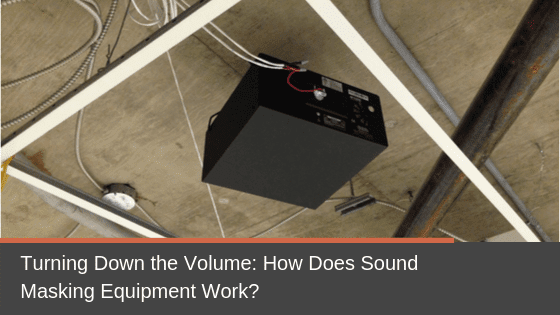One of the most-heard complaints about open-plan offices is how noisy they are. Without walls and doors to block sounds, noise travels unimpeded across the room.
Whether it’s the din of chatter, loud typing or the constant whir of the photocopier, there’s no shortage of sounds that can distract you. Out of all this disruption, sound masking has emerged as a great way to turn a noisy office into a comfortable, quiet space where employees can work undistracted.
First, let’s look at what sound masking is and how it works. In theory, anything that makes a sustained noise can be used to absorb or mask other sounds. But if you’re looking for a genuinely useful way to offset noise, a well-designed sound masking system is the way to go.
Unlike other forms of sound management, sound masking introduces more sound into the environment rather than removing or blocking it. Sound masking systems digitally create a white noise in the background that is adjusted and tailored to each office environment.
The result is a soft, pleasant sound that’s distributed evenly throughout the space using special speakers, making other office noises less noticeable, and while it doesn’t eliminate conversation noise, it does make it incomprehensible.
Sounds pretty good, doesn’t it? You still might be wondering what the real benefits are. Here are some of the top reasons our customers ask to have a sound masking system installed in their offices:
#1. Boost Productivity
Research shows that the level of sound at work has a significant impact on the health and productivity of workers. And it’s not just open offices that have a noise problem; it’s also an issue in offices with high-panelled systems furniture layouts.
If you can hear your colleagues on the phone or talking to each other several cubicles away, it’s not going to be easy to concentrate on your work.
Studies show productivity decreases by as much as 40 percent due to noise and distractions, and distracted workers are also more likely to make mistakes. The Data Entry Management Association states that data entry errors can go up by as much as 38 percent because of office noise and distractions. By using sound masking in your office, you can reduce annoying distractions and help employees stay happy, focused and productive.
#2. Enhance Security
Virtually every office has information that it needs to keep private. It could be company trade secrets, private customer data or sensitive details about employees.
Sound masking can help you keep that information confidential by increasing speech privacy.
The idea behind speech privacy is to make it as difficult as possible for people to overhear the conversations of others unintentionally. Sound masking does this by using unobtrusive sounds to disguise communication so that, while you can hear sound when others speak, what is being said is indistinguishable.
#3. Improve Office Comfort
Sound masking digitally creates sounds that are designed to match the frequencies of human speech and be pleasing to our ears. That sound flows throughout the space and blends into the natural background.
Sound masking doesn’t cancel or eliminate all sounds from others’ conversations; it merely reduces how far away speech can be heard and understood by others. The concept is like sitting in a busy restaurant, you know people are talking, but you can’t pick out sentences or follow the conversation.
The goal is to create a uniform measure of sound across an entire office space at a consistent volume and frequency level so that the hum of the masking system becomes part of the environment.
#4. Enhance Employee Well-being
Reducing office noise won’t just improve employee productivity – it can also brighten people’s moods and enhance their overall well-being. Noisy workplaces do real harm to office morale. In one UK survey, 44 percent of workers said noise at work made them stressed, and more than half said they were interrupted by noise distractions more than five times a day.
Using sound masking to reduce noise distractions means workers will have fewer reasons to feel frustrated and annoyed. Not only does this make them more efficient and productive, but you should also see an improvement in the general mood of employees when they’re empowered to get the job done without being constantly interrupted.
Can My Business Benefit from Sound Masking?
Every business, no matter how small, can benefit from sound masking, but there are a few where the technology adds the most value.
- Any large office with an open plan is an obvious choice, especially places like newsrooms and call centres where there are a lot of people talking on phones and working near each other.
- Businesses and organizations that need to keep specific information confidential can also benefit greatly by sound masking, for example, law firms, government offices, hospitals and security companies.
There are other ways to reduce office noise, but sound masking can be one of the most effective options. Do you think sound masking is something that could benefit your business?
Looking for ways to boost the visual privacy of your office as well?
Cory Porteous
Director of Marketing & Inbound Business Development
Office Interiors




